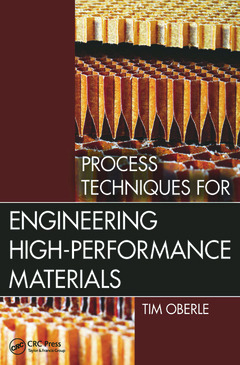Process Techniques for Engineering High-Performance Materials
Auteur : Oberle Tim

Most processed materials retain a memory of their production process at the molecular level. Subtle changes in production?such as variations in temperature or the presence of impurities?can impart performance benefits or drawbacks to individual batches of products. Some product developers have taken advantage of this process dependency to tailor properties to specific customer needs. In other cases, poorly engineered processes have resulted in serious failures. Process Techniques for Engineering High-Performance Materials explores practical strategies to guide you in systematically developing, improving, and producing engineered materials.
The book describes an R&D approach that is common to many material types, from polymers, biochemicals, metal alloys, and composites to coatings, ceramics, elastomers, and processed foods. Throughout, hundreds of examples illustrate successes and disasters in the history of materials development. These examples clearly show how product management and development tactics are constrained by the nature of the production process and the strategy of the company.
The author offers practical advice on how to:
- Foster creativity in an industrial environment and avoid factors that unintentionally suppress technical innovation
- Develop products when the properties of the product are highly dependent on processing variables
- Avoid the inevitable scale-up problems that occur on process-dependent materials
- Get the most out of expensive trial work in a production plant environment
- Combine products into a systems solution to customer problems
Highlighting important rules for product development, this book helps you better understand the mechanics of engineering processed materials and how to adjust your processes to improve performance.
Date de parution : 06-2013
15.6x23.4 cm
Date de parution : 07-2017
15.6x23.4 cm
Thèmes de Process Techniques for Engineering High-Performance... :
Mots-clés :
Can; MSDSs; processed materials; Plant Trials; engineered materials; Follow; product development; Raw Material; process development; Process Path; materials development; All; material science; Muzzle Velocity; manufacturing processes; Dense; manufacturing science; Protective Packaging; manufacturing engineering; Tabletop; materials processing; Smooth; fitness-for-use; Scrambling; Development Professionals; Proprietary System; Moisture Content; Rounded Windows; Engineering Handbooks; High Fructose Corn Syrup; Iodoquinine Sulfate; Small Scale Equipment; Small Scale Development; Bag Machines; Specific Lot Number; Red Phosphorus



